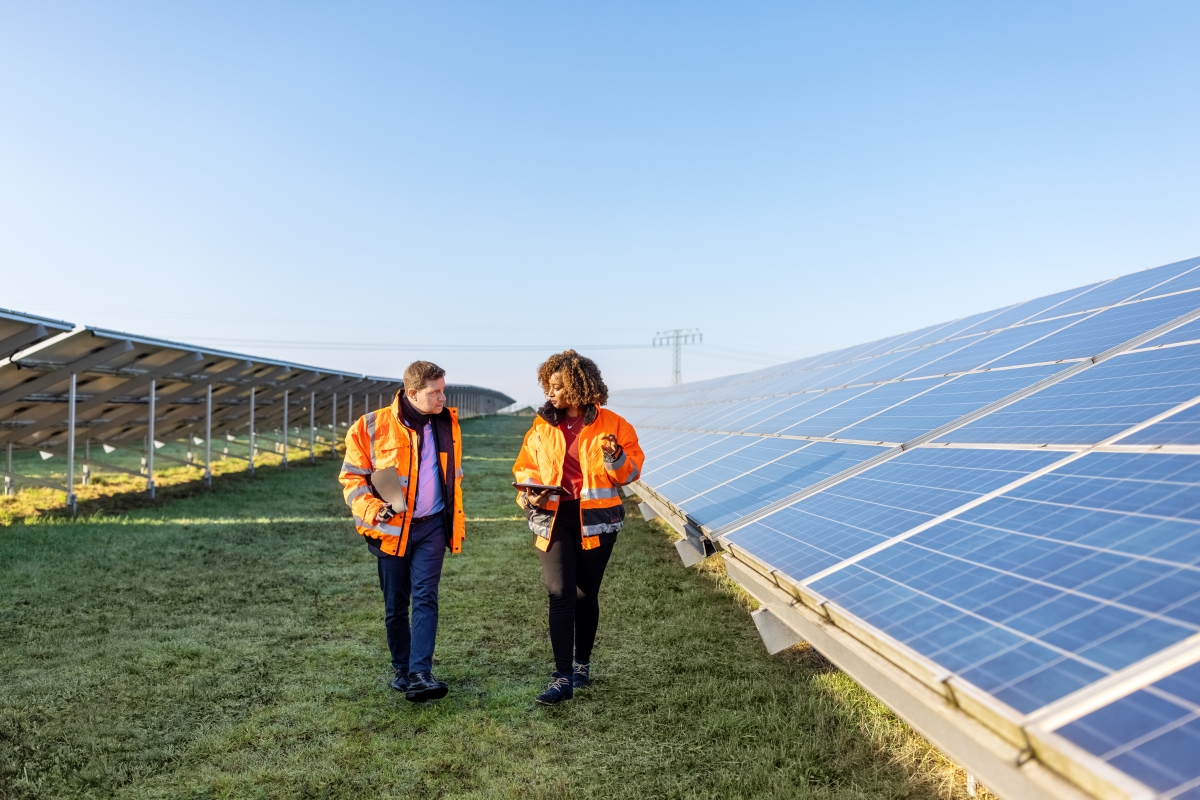Choosing between Environmental Standards and a Rapid Transition to Renewable Energy Is a False Dilemma
May 24, 2023
By Jamie Pleune
Debunking the claim that there must be a choice between progressive climate policy reform and environmental protections.
The claim that there must be a choice between progressive climate policy reform and environmental protections holds no weight. Progressive climate policy reforms can be enacted without compromising environmental protections or communities’ right to engage with infrastructure projects that impact their own physical and economic well-being.

"We can improve permit processing times by bolstering agency capacity, fostering early communication with permit applicants, and improving permit coordination."
Introduction
In March, the International Panel on Climate Change (IPCC) issued its Sixth Assessment Report. The report contained an unmistakable theme: Rapid, deep, and immediate greenhouse gas emission reductions must be achieved this decade in order to limit warming to between 1.5° and 2° Celsius.1 Consistent with this reality, the Biden administration has set an ambitious US goal of achieving a 50 to 52 percent reduction in greenhouse gas pollution from 2005 levels by 2030, as a step toward net zero by 2050. As an intermediate milestone, President Biden set a goal of reaching 100 percent carbon-pollution-free electricity by 2035.
Several studies indicate that this target is ambitious but achievable using current technology. As one report described, “there is widespread and growing consensus among experts and practitioners that achieving 80 percent clean electricity by 2030 is technologically feasible without compromising reliability and affordability.”2 Achieving an 80 percent clean grid by 2030 will require roughly 950 gigawatts (GW) of wind and solar to be built, sited, and connected to the grid within the next decade.3 By comparison, the size of today’s power sector is approximately 1,000 GW.4
The sheer scale of these challenges, combined with the unrelenting sense of urgency to respond to climate change, has led some people to conclude that the only way to achieve a rapid deployment of clean energy is to forego elements of permitting and enforcement of environmental standards. The most common target is the National Environmental Policy Act (NEPA), which is often blamed for creating delays during the permitting process. For example, Jeremy Harrell, the Chief Strategy Officer for ClearPath, a renewable energy development company, recently asserted that “it can now take six years to permit carbon dioxide storage locations . . . 16 years to permit an offshore windfarm . . . and up to 15 years for a new transmission line.”5 These anecdotal numbers capture headlines, but they do not accurately reflect how long NEPA analysis actually takes.
Research shows that the anecdotal examples of four- to ten-year timelines to complete a NEPA analysis are the exception, not the rule. Most NEPA decisions are made within a reasonable time for the complexity of the project, and the analytical rigor applied to a project is tailored to the intensity of a project’s impacts. However, efficiency, predictability, and transparency within the NEPA process could be improved. A wide body of research indicates that most delays in the NEPA process are functional, not regulatory. Insufficient staff, unstable budgets, vague or incomplete permit applications, waiting for information from a permit applicant, or poor coordination among permitting authorities are the primary causes of delay. These unproductive causes of delay can be addressed without eliminating environmental standards, analytical rigor, or community engagement.
Finally, research also shows that NEPA serves as an umbrella statute, facilitating compliance with other laws. Eliminating NEPA’s procedural requirements could compromise its capacity to facilitate compliance with other laws. Instead of streamlining the permit process, this would increase the risk that projects will encounter delays caused by a lack of coordination between permitting authorities, especially for projects with overlapping laws and regulatory standards. In summary, there are ways to make the permitting process more efficient, transparent, and predictable. However, to achieve those objectives, the solutions must be tailored to the problems.
This issue brief describes the role NEPA plays during the permitting process, explains the evidence regarding NEPA decision-making times (spoiler alert: they are shorter than critics claim), and identifies the true causes of delay that plague permitting processes. It also explores reforms that have a demonstrated track record for improving transparency, predictability, and timeliness in permitting times without compromising environmental standards or public participation. Finally, the brief closes with a reminder of what is at stake: The climate crisis requires prompt attention, and efficiency in permitting is paramount. However, that does not mean that every project deserves quick approval. The permitting process ensures that projects adhere to minimum standards designed to protect human health, safety, property, and the environment. These standards protect the air we breathe, the water we drink, and the soil in which we grow our food—crucial resources for a sustainable future. Degrading these resources in our haste to build renewable energy infrastructure would repeat the mistakes of the past. And as we have learned from decades of climate denialism, ignoring environmental risks does not make them go away.
1International Panel on Climate Change, Sixth Assessment Report, Summary for Policymakers 21, B.6 (Mar. 2023). This white paper draws heavily from written testimony that the author submitted to the House Natural Resources Subcommittee on Oversight and Investigations on May 11, 2023.
2Energy Innovation, A National Clean Electricity Standard to Benefit All Americans 1 (Apr. 2021); Nikit Abhyankar et al., 2030 Report: Powering America’s Clean Economy: A Supplemental Analysis to the 2035 Report (Apr. 2021) (using the latest renewable energy and battery cost data to demonstrate the technological and economic feasibility of achieving 80 percent clean (carbon-free) electricity in the United States by 2030).
3 Id. at 19; Eric Larson et al., Princeton University, Net Zero America: Potential Pathways, Infrastructure, and Impacts (Oct. 2021) (projecting a need for 850 GW of solar and wind energy for a high electrification scenario and projecting that a 76 percent increase in transmission would be needed); Nikit Abhyankar et al., 2030 Report: Powering America’s Clean Economy: A Supplemental Analysis to the 2035 Report 7, 28 (Apr. 2021) (estimating that 950 GW of new wind and solar generation and over 225 GW of battery storage capacity must be built, averaging about 120 GW of new capacity per year to achieve 80 percent clean energy by 2030).
4Nikit Abhyankar et al., 2030 Report: Powering America’s Clean Economy: A Supplemental Analysis to the 2035 Report 28 (Apr. 2021).
5Written Testimony of Jeremy Herrell, ClearPath Inc., US Committee on Natural Resources, Subcommittee on Oversight and Investigations, “The Biden Administration’s Executive Overreach and Its Impact on American Energy Independence” (May 11, 2023).
Key Takeaways
Takeaway #1
Research doesn’t substantiate the claim that NEPA’s procedures cause significant delays in renewable projects. If we go beyond anecdotes, the largest national study of NEPA reviews surveyed 41,000 cases and shows that NEPA EIS statements’—the most stringent form of review—median time to completion is 2.8 years. These reviews account for just 2% of all NEPA reviews.
Takeaway #2
True causes of delay can be addressed without compromising environmental or safety standards or community engagement. The sources of delay are admin and expert staff shortages, coordination between permitting bodies, and operator (developer) delays.
Takeaway #3
Progressive reforms that address these sources of delay will help speed up the review process without compromising environmental protections or communities’ right to engage with infrastructure projects that impact their own physical and economic well being.
- Build agency capacity with long-term funding and strategic workforce planning
- Early stakeholder engagement—communities and regulators
- Permit sequencing and transparent schedules
Takeaway #4
Renewables face the larger threat to build out—transmission capacity and connectivity.
Takeaway #5
Rushed decisions—by cutting corners with environmental protections—will cause long-term consequences and delays.
Author
Jamie Pleune
Jamie Pleune is an environmental lawyer and scholar at the S.J. Quinney College of Law, University of Utah, where she works as an associate professor of law (research) and Wallace Stegner Center fellow. The Wallace Stegner Center has done extensive empirical research into the functionality of environmental statutes, including the National Environmental Policy Act. In the past year, Jamie’s research has focused particularly on distinguishing between productive and unproductive causes of delay in the permitting process, and tailoring solutions to address the unproductive causes of delay without compromising environmental standards or procedural transparency. Jamie received her BA from Colorado College, her JD from University of Utah, and her LLM from Georgetown University Law Center, where she worked as a clinical fellow with the Institute for Public Representation.
